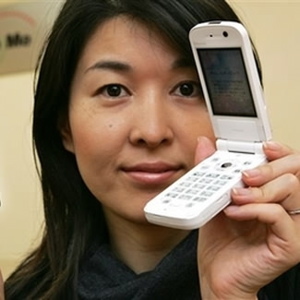Cell Phone College Classes
 For students who found taking college classes over their computers too constraining, a Japanese university now offers one of their courses via cell phone.
For students who found taking college classes over their computers too constraining, a Japanese university now offers one of their courses via cell phone.
Japanese already use cell phones to shop, read novels, exchange e-mail, search for restaurants and take video clips. Now, they can take a university course.
Cyber University, the nation’s only university to offer all classes only on the Internet, began offering a class on mobile phones Wednesday on the mysteries of the pyramids. For classes for personal computers, the lecture downloads play on the monitor as text and images in the middle, and a smaller video of the lecturer shows in the corner, complete with sound. The cell phone version, which pops up as streaming video on the handset’s tiny screen, plays just the Power Point images.
[…]
Sakuji Yoshimura, who heads Cyber University and gives the pyramids course, said the university provides educational opportunities for people who find it hard to attend real-life universities, including those with jobs and those who are sick or have disabilities. “Our duty as educators is to respond to the needs of people who want to learn,” Yoshimura said.
He scoffed at those who question the value of Internet and cell-phone classes, noting attendance is relatively high at 86 percent. Whether students play the lecture downloads to the end can be monitored by the university digitally, officials said.
Although real-time exchange with professors and other students isn’t possible in Net classes, social networking and other cyber-discussions are flourishing, said Hiroshi Kawahara, professor in the Faculty of Information Technology and Business.
This gives new meaning to “phoning it in,” a practice of which not a few senior professors have been accused.
Having taught several graduate-level courses online and found the quality of the exchange decidedly inferior to the traditional residential experience, I’m incredibly skeptical of the value of classes delivered in a tiny screen without sound or the ability for students to engage the professor or their colleagues.
Story via OTB News. Photo via Wired Gadget Lab.






James, very timely discussion. Did you hear this on “Morning Edition” today?
The Japanese are the ultimate early adapters of technology and their mobile phone systems and gadgets are light years ahead of ours. I’ll bet we’ll see this about 5-10 years in the US.
The problem with “education” like this and other purely on-line courses is the lack of discussions and learning from others in the classroom. I meet so many people every day that can’t write complete sentences or have no knowledge of the basics of grammar, math etc… yet they have college degrees. Then again, any additional education, no matter the venue or means of instruction, is better than nothing. I guess the folks who get on-line degrees or degrees from diploma mills should not expect too much out of them in terms of advancing their careers.
Mike – you really need to read/listen to that NPR story. There is plenty of student/teacher interaction at the online courses. All of them have the full microphone/headset setup, and the students seem to be much more focused on the subject at hand. This is not the old diploma mill you’re describing.